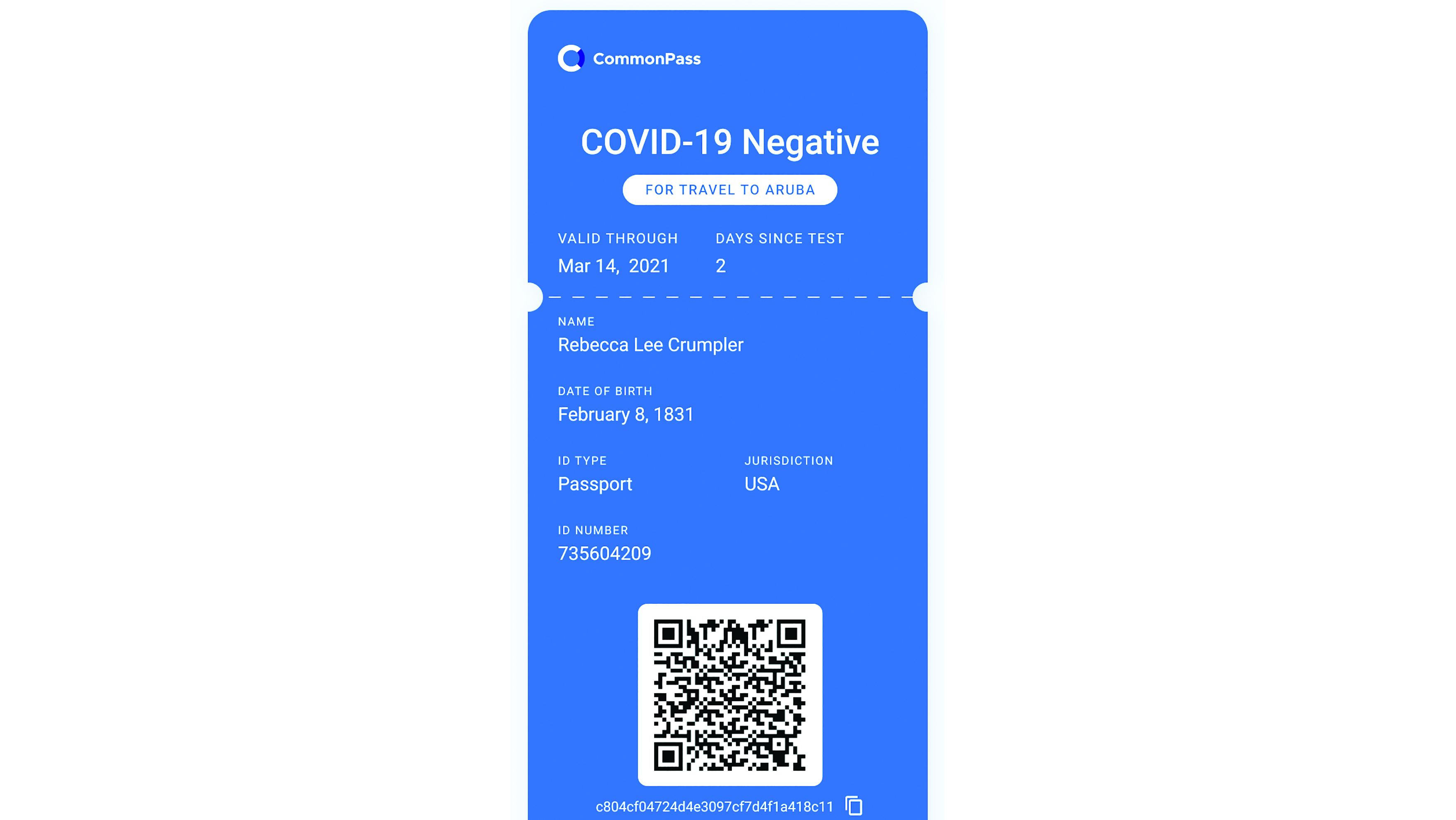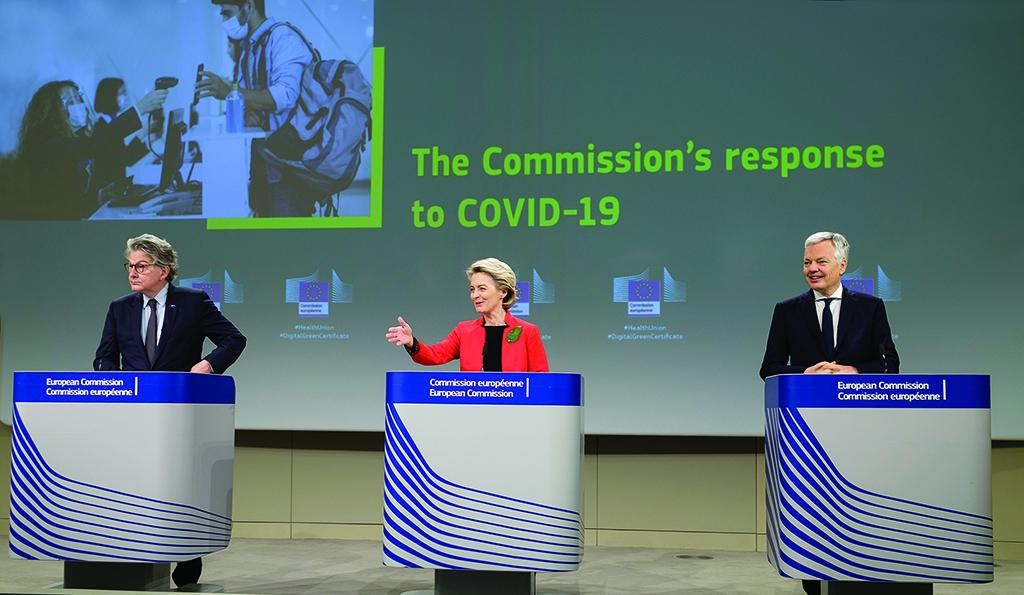Digital Passports Could Be Key To International Travel Recovery

As vaccination drives gather steam across the globe, airlines and governments are scrambling to determine how best to prove inoculation of international travelers, including through the use of digital health passports.
In Europe, carriers operating at a fraction of their normal spring levels are hoping plans for a digital green certificate—a document that will provide proof of a negative COVID-19 test, antibodies or vaccination—will boost confidence and convince consumers to book summer vacations.
The European Commission’s Digital Green Certificate will be available for free in digital or paper format, including a QR code to ensure both security and authenticity. The digital certificate will allow travelers within the EU to demonstrate that they have either recovered from COVID-19, been vaccinated or tested negative.
- European Commission proposes Digital Green Certificate for travel
- In U.S., Biden administration does not support federal health passports
Announcing the plan, the commission sought to reassure citizens about privacy, free movement and data security, noting that the certificate will be valid in all EU countries and will not be a precondition for travel within the EU.
Countries will not be able to retain personal data contained in the certificate, as the commission plans to build a gateway that will be able to verify the individual digital signature keys allocated to certificate-issuing bodies—such as hospitals, test centers or health authorities—meaning personal data itself does not pass through the gateway.
The commission says it aims to have the technical work on the digital green certificate and the proposal completed in the coming months. But even if that progresses smoothly and the passport is ready for the summer season, recovery is far from assured, due to rising infection numbers and tightening health restrictions in many countries.

Industry groups including Airlines for Europe and the Inter-national Air Transport Association (IATA) welcomed the digital green certificate but also called for work to begin on an EU road map setting out the conditions, criteria and possible timing for the easing and lifting of travel restrictions, as well as a harmonized implementation of testing policies.
Airlines and airports want to avoid a repeat of last summer, when a recovery was abruptly curtailed by last-minute changes to travel restrictions and requirements that saw consumers reluctant to book flights for fear of an unexpected quarantine requirement on returning home.
IATA has previously warned that health information about passengers must be available in digital form for a restart of international air travel, in order to make the recovery sustainable from an operational point of view.
The association has also put forward its own solution, the IATA Travel Pass, a mobile app that will store testing and vaccination data. Individual airlines including Air France, British Airways and Ryanair have also taken matters into their own hands with health-data apps.
Singapore Airlines was one of the Asia-Pacific leaders in testing the IATA Travel Pass. Several other carriers in the region are also trying out the IATA app or have agreed to do so, including: Air New Zealand, All Nippon Airways (ANA), Korean Air, Qantas, Thai Airways and Thai VietJet, among others.
Some carriers, such as ANA and Qantas, are assessing the CommonPass alternative in addition to the IATA system. Cathay Pacific has conducted trials with CommonPass.
Qantas says it intends to integrate such a system into its own app in the longer term. CEO Alan Joyce has previously said the airline will likely require international passengers to have proof of vaccinations when the vaccine becomes widely available. The Australian government has announced that vaccination certificates will be issued and made available through its Medicare and MyGov apps.
Malaysia Airlines plans to develop and release its Digital Travel Health Pass, which it says will “incorporate some modules” from the IATA Travel Pass. The carrier’s approach of integrating IATA elements into its own app “is an important milestone for the IATA Travel Pass,” says Nick Careen, IATA senior vice president for airports, passengers, cargo and security. The partnership “will demonstrate the [IATA] app’s interoperability, an important feature supporting its global uptake,” Careen says.
While the initiative so far has not been expanded for the use of vaccination records, the CommonPass project has indicated plans to allow customers to store such records on the app soon.
In the U.S., the Biden administration has said it does not support the creation of a federal program for vaccine passports. On March 29, Andy Slavitt, the acting administrator of the Centers for Medicare and Medicaid Services, told reporters: “The government is not viewing its role as the place to create a passport. . . . We view this as something the private sector should do.”
While U.S. carriers are not currently requiring proof of vaccination to fly, they are collaborating with certain providers of digital health credentials to expedite the boarding and clearance process on flights to certain destinations, while leaving the door open to expanding their digital offerings to include vaccine records eventually.
JetBlue Airways, for example, is using CommonPass as a means for passengers to display their negative COVID-19 test results on flights from Boston to Aruba, while United Airlines is allowing customers to upload health records using the CommonPass app on flights from Newark, New Jersey, to London.
Another initiative is Clear, which uses its Health Pass app to link travelers with their health records, including on routes operated by Delta Air Lines and United Airlines to Hawaii from the U.S. West Coast. Using the app, customers arriving in Hawaii can get a wristband at the airport that enables faster processing times. Clear has also said it will begin validating vaccine information soon.
American Airlines, meanwhile, is offering customers flying internationally to the U.S. the ability to upload their health records related to COVID-19 testing and to fulfill other travel requirements through its VeriFLY app.
A coalition of several dozen aviation groups—including Airlines for America, Airports Council International-North America and IATA—urged the Biden administration in a March 22 letter to develop “uniform principles” for COVID-19 health credentials.
“The [Centers for Disease Control and Prevention] should provide global leadership by ensuring the wide array of [credentialing] technologies can securely validate both test results and vaccination history, protect personal data, comply with applicable privacy laws, and operate across local, state and international jurisdictions,” the groups wrote in a letter addressed to White House COVID-19 Coordinator Jeffrey Zients.
Capital Alpha analyst Rob Smith wrote in a research note that the Biden administration’s plan to have enough supply to vaccinate all U.S. adults by the end of May should lead to “increased policy and industry focus on digital vaccine passports.” Still, he observed that outstanding legal and regulatory hurdles could potentially delay the timely implementation of new health technologies.
“It remains to be seen how and whether airlines, employers, and others will require use of certain apps, and we expect numerous legal challenges as to whether and under what circumstances they can require proof of vaccination,” Smith wrote.





Comments
In our case, we did not get vaccinated through a normal health provide and I have no idea if those records have any access let alone ours.
We do have cars and we don't have a Cell phone anyway.
Having your medical stuff exposed though another group of portals in each Airline?
What did we do in the old days? Yep, it was stamped in your travel passport and that is at least one answer though that too limits people
As your drivers licenses in now real ID it could be put in there (except republican controlled states which won't do it)